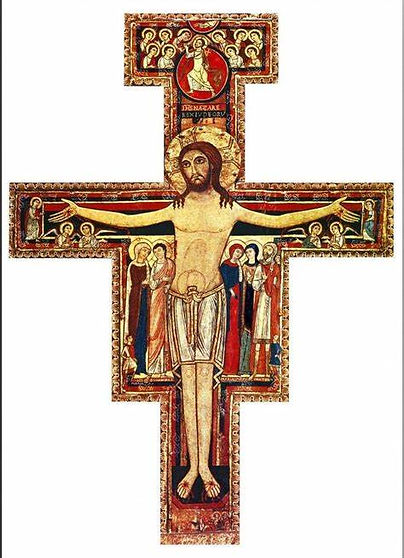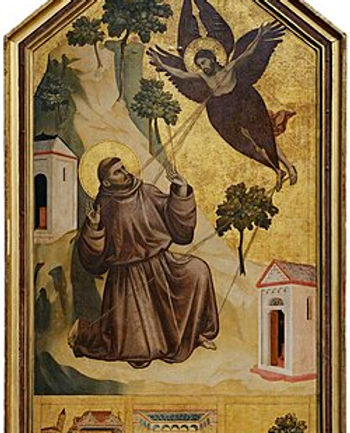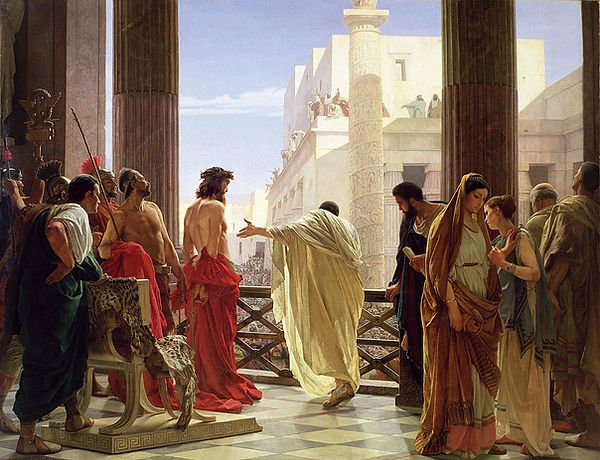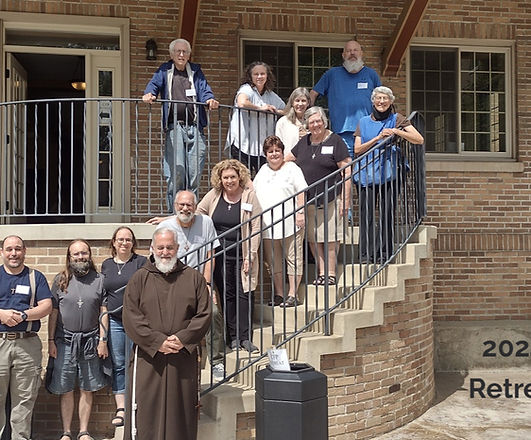
Confraternity of Penitents Newsletter -- September 2025
SEPTEMBER HAPPENINGS
Attention CFP Affiliates, Associates, Life Pledged Members. And ALL.
September 7th, Pope Leo the 14th will canonize Blessed Carlo Acutis as the First Millennial Saint.
September 14: Feast of the Holy Cross and Pope Leo’s birthday. He will 70. Pray for him.
September 15: Feast of Our Lady of Sorrows. Carlo Acutis, was baptized at a Church in London named Our Lady Of Sorrows. It's a tradition, for many Franciscans, to pray the 7 Sorrow's, during Lent.
September 17: Feast of the Stigmata of Saint Francis.
September 29: Feast of the Holy Archangels, Michael, Gabriel, and Raphael
--Bryan LaHaise, CfP Affiliate
The Confraternity of Penitents Holy Angels Gift Shop has prayer cards, medals, and other materials dealing with Saint Carlo Acutis, the Feast of the Holy Cross, Our Lady of Sorrows, the Archangels Michael, Gabriel, and Raphael, and many Franciscan items. See www.cfpholyangels.com or call 260-739-6882 (does not take texts). Write to CFP Holy Angels Gift Shop, 1702 Lumbard Street, Fort Wayne IN 46803 US

IINSIGHT FROM THE SPIRITUAL GUARDIAN: REFLECTION FOR THE FEAST OF THE STIGMATA OF ST. FRANCIS
On September 17, the Church celebrates a mystery that startled the world in the 13th century and still awakens our souls today: the Stigmata of St. Francis of Assisi. On Mount La Verna, while immersed in prayer and longing to be united more perfectly with Christ crucified, Francis received in his very flesh the wounds of our Savior. The marks of the Passion were impressed upon him, not as a mere symbol, but as a participation in the sufferings of Christ. This feast does not simply recount a miraculous occurrence; it invites us, as penitents, to enter more deeply into the mystery of the Cross.
St. Paul once said, “I bear on my body the marks of Jesus” (Gal 6:17). These words became literally true in Francis, who, through his burning love, was conformed so closely to the Crucified that his body bore the nails and the pierced side of Christ. Yet the deeper reality is interior: Francis bore within his heart the love that moved Christ to embrace the Cross. He longed to love as Jesus loved—poor, humble, obedient, and willing to give himself totally for the salvation of souls.
For us, members of the Confraternity of Penitents, the Stigmata is not a call to extraordinary miracles but to ordinary fidelity. We may not receive wounds in our flesh, but by living our daily conversion we receive them in our hearts. Every renunciation of sin, every act of forgiveness, every discipline of prayer and penance, every hidden work of charity—these are the invisible stigmata, signs that we are dying to self and rising with Christ.
The world often resists the Cross, seeking comfort, success, or self-fulfillment apart from God. But penitents know that true freedom is found only in surrender. Francis, on La Verna, asked not for consolation but for conformity. He prayed to feel both the love and the pain of Christ crucified, so that his heart might never wander from divine charity. This is our path as well: to embrace daily crosses—misunderstandings, temptations, humiliations, fatigue—with patience and love, seeing in them opportunities to grow in union with Jesus.
The feast also reminds us of the fruitfulness of suffering embraced with love. Francis did not withdraw into bitterness after receiving the Stigmata; rather, he radiated even greater joy and peace. He had entered the heart of Christ and discovered that the Cross is not the end but the beginning of resurrection life. For penitents, this means that our sacrifices, hidden though they may be, bear fruit in the Church and in the world. United to Christ, even our smallest offering has eternal value.
As we celebrate this feast, let us renew our desire to be conformed to Christ crucified. Let us not shrink from the discipline of penance, but embrace it as our pathway to freedom. And let us remember that the wounds of Francis point us to the greater mystery: the infinite love of Jesus, who bears our sins, heals our wounds, and opens to us the joy of eternal life. – Prayer: St. Francis, wounded with the wounds of Christ, teach us to love the Cross, to live our penance with joy, and to bear in our hearts the marks of Jesus until we are united with Him forever. Amen. –Fr. Joseph Tuscan, OFM Cap, CFP Spiritual Guardian

NO GREATER LOVE: JESUS AND PONTIUS PILATE
After Jesus was found guilty of blasphemy by the Jewish Sanhedrin, He still needed to be brought before the Roman governor, Pontius Pilate, so that He could be crucified since only Pilate had the power to crucify Him. Those who wanted Jesus crucified where mainly two groups. First, there was the Jewish Sanhedrin who ruled the Temple and the religious affairs of Jews and considered Jesus to be a dangerous blasphemer who might destroy the Temple religious system of animal sacrifices. The other group was the followers of the insurrectionist Barabbas. He was in prison, but could be released because of the customary Passover amnesty of a prisoner. This could happen by popular acclamation. These people would want their leader to be released rather than Jesus. The High Priest Caiaphas and the Jewish Sanhedrin needed a charge to level against Jesus to Pilate since the charge of blasphemy would mean nothing to Pilate, the gentile governor. They told Pilate, “We found this man perverting our nation, and forbidding us to give tribute to Caesar, and saying that he himself is Christ a king.” (Lk 23:2)
Pontius Pilate, therefore, was faced with a dilemma. What is he to do with this Man who was brought before him and charged by the High Priest Caiaphas and the Jewish Sanhedrin with being a dangerous criminal and a threat to Rome who ought to be crucified? Pope Benedict, in Jesus of Nazareth, gives us insights into the decision which Pilate had to make. The image of Pilate in the Gospels presents the Roman Prefect quite realistically as a man who could be brutal when he judged this to be in the interests of public order. Yet he also knew that Rome owed its world dominance not least to its tolerance of foreign divinities and to the capacity of Roman law to build peace. This is how he comes across to us during Jesus' trial.
The charge that Jesus claimed to be king of the Jews was a serious one. Rome had no difficulty in recognizing. regional kings like Herod, but they had to be legitimated by Rome and they had to receive from Rome the definition and limitation of their sovereignty. A king without such legitimation was a rebel who threatened the Pax Romana and therefore had to be put to death.
Pilate knew, however, that no rebel uprising had been instigated by Jesus. Everything he had heard must have made Jesus seem to him like a religious fanatic, who may have offended against some Jewish legal and religious rulings, but that was of no concern to him. The Jews themselves would have to judge that. From the point of view of the Roman juridical and political order, which fell under his competence, there was nothing serious to hold against Jesus.
Pilate needed to know what was going on among the Jews whom he ruled so he must have had spies who informed him of any dangers to his rule. Pilate would not have had anything to do with Jesus had if He not been brought before him as a criminal and dangerous claimant to kingship. Pilate knew that he needed to question Jesus himself to find out what he was to do with Him. Pilate had Jesus brought into his residence, the praetorium, and asks Him, “Are you the King of the Jews?” (Jn 18:33) Jesus, however, then asks Pilate a question, “Do you say this of your own accord, or did others say it to you about me?” (Jn 18:34) Jesus wanted to know whether Pilate really thought that He was claiming to be the “King of the Jews”, or was he just repeating the accusation that the Jewish Sanhedrin had brought against Him. Pilate tells Jesus that he knows nothing about Jesus being the “King of the Jews” but is just repeating the accusation brought against Jesus. “Am I a Jew? Your own nation and the chief priests have handed you over to me; what have you done?” Jesus then affirms that He is a King but not in a way which is a threat to the worldly power of Pontius Pilate. “My kingship is not of this world; if my kingship were of this world, my servants would fight, that I might not be handed over to the Jews; but my kingship is not from the world.” (Jn 18:36) Jesus was reminding Pilate that He had not resisted being arrested in the Garden of Gethsemane.
Here was Pilate’s dilemma. He knew that the High Priest Caiaphas and the Jewish Sanhedrin wanted Jesus crucified, but Jesus had many followers, and he was not sure what they would do if He was crucified. Perhaps he could “pass the buck” to someone else. Pilate discovered that Jesus was a Galilean and was thus under the jurisdiction of Herod Antipas, the ruler of Galilee and Perea. He then sent Jesus to Herod who was in Jerusalem at that time. Herod was an Edomite and thus was a descendent of Esau, the brother of the patriarch, Jacob, who was the father of the twelve tribes of Israel. Esau had sold his birthright to Jacob (Gen 25:27-34) and then lost the blessing of his father, Isaac, through the trickery of his mother, Rebekah. (Gen 27:1-40) Esau became the patriarch of the nation of Edom which was historically one of the enemies of Israel. Herod knew about Jesus because he governed Perea, east of the Jordan river where John the Baptist was preaching. Herod was living with his mistress, Herodias, who was the wife of his half-brother, Herod Philip. John had denounced Herod’s union with Herodias, since it was unlawful (adultery). Herod then put John into prison but still continued to listen to him. (Mk 6:20) However, he beheaded John at the request of his mistress Herodias. (Mk 6:14-29, Mt 14:1-12) When Jesus was brought to Herod, he was glad to see Jesus and hoped to see Jesus perform a miracle. (Lk 23:8) He questioned Jesus extensively, but Jesus gave no answer (Lk 23:9). Why not? Perhaps He had nothing to say to Herod, the unrepentant sinner. Luke’s Gospel then tells us, “And Herod and Pilate became friends with each other that very day, for before this they had been at enmity with each other.” (Lk 23:12) They saw that their interests were in common since Pilate governed under the Roman Empire and Herod had been installed by Rome as “tetrarch” over Galilee and Perea. Both saw no danger to their rule from Jesus and had contempt for the Jewish rulers in Jerusalem, some of whom wanted to be free of Roman rule, and considered Herod to be an illegitimate ruler since he was not a descendant of King David.
Herod sent Jesus back to Pilate, which meant that he had to deal with Jesus himself. Pilate knew he had to do the “dirty work” of Caiaphas and the Sanhedrin because of the threat of rioting and disorder which the Sanhedrin hung over him, yet he did not want to look like the “bad guy” who had an innocent man crucified. Pilate’s wife told him, “Have nothing to do with that righteous man, for I have suffered much over him in a dream.” (Mt 27:19) Pilate tried to escape from blame for the death of Jesus by offering the Passover amnesty of a prisoner to Jesus. Of course, the crowd wanted to free the insurrectionist Barabbas, instead. “Now the chief priests and the elders persuaded the people to ask for Barabbas and destroy Jesus.” (Mt 27:20). Pilate kept maintaining that he wanted to free Jesus, but the crowd demanded that Barabbas be released. Pilate, however, tried to absolve himself of blame for the crucifixion of Jesus by washing his hands in front of the crowd and saying “I am innocent of this righteous man’s blood; see to it yourselves.” (Mt 27:24). The crowd answered, “His blood be on us and on our children!” (Mt 27:25)
There was one last exchange between Jesus and Pilate recorded in the Gospels. When Pilate had heard that Jesus had claimed to be the Son of God he went back into his residence and asked Jesus, “Where are you from?”, (Jn 19:9) but Jesus did not answer him. Pilate then says to Jesus, “You will not speak to me? Do you not know that I have power to release you, and power to crucify you?” (Jn 19:10) Jesus answers him, “You would have no power over me unless it had been given you from above; therefore he who delivered me to you has the greater sin.” (Jn 19:11) Pilate is asserting his power over Jesus and expects Jesus to acknowledge that power. Jesus, however, reminds Pilate that his power comes from God. The One over whom Pilate was claiming power is actually the source of his power.
After Jesus had been scourged, beaten, mocked, crowned with thorns, and robed with a mocking royal purple robe, Pilate presents Jesus to his accusers in such pitiable state saying, “Here is your king!” (Jn 19:14) The mob replied, “Away with him, away with him, crucify him!” (Jn 19:15) Pilate answers, “Shall I crucify your King?” (Jn 19:15) The chief priests give their final reply, “We have no king but Caesar.” (Jn 19:15) Pilate was certainly surprised that the One whom the Jewish authorities were claiming to be a King and thus a threat to the rule of Pilate, was not resisting him nor were His followers resisting Pilate and the Romans. He was probably mocking the Jewish authorities by asserting that this Man in such a pitiable state was their King. To Pilate, and to secular powers down through the ages to the present, power comes from “below”, money, political power, armies, weapons, and other means of force. Even the chief priests only recognized worldly power when they said “We have no king but Caesar.” Earlier, Jesus tells Pilate “You would have no power over me unless it had been given you from above.” The power of Jesus and His followers also comes from “above” but do we now recognize that Power? – Jim Nugent, CfP
LIFE PLEDGE IN PRISON: ANTHONY LaCALAMITA, CfP

Praise God from whom all blessings flow! At our Communion Service on Wednesday, August 13th at approximately 8:45am, Deacon Jerry Roersma received my life pledge to live the Rule with the Confraternity of Penitents, with Bob Messer as a CfP witness!
I had my cell to myself the night before, since my former bunkie Paul was transferred (I will miss him - a Messianic Jew with wit, humor, and talented guitarist). I was able to spend some quality time in prayer and meditation. During my sleep, the Lord gave me a message for the unit service I'm scheduled to lead on 8/24: "Breathe the Life Breath of God." We need to realize that God has given us the breath of life, like in the book of Genesis where he breathed life into the ground to form Adam, he created us with his life. God reminds us of this later in Deuteronomy when Moses tells the people to choose life, and later in John's Gospel when Jesus tells us that he came that we might have life, and have it abundantly. Feel the pulse in your carotid artery - that is evidence of the life each one of us has been gifted with to serve the One who gave that life to us for his purpose. We are to allow that life to flow through us toward others and his creation. When we sin, we squelch that life. When we allow Jesus into our lives, he can forgive us and strengthen us to live a more grace-filled life. When we accept Jesus as our friend, brother, master, and savior, we are welcoming new life, a supernatural life that can elevate our natural bodily life to go beyond our purely natural desires. Instead of criticism, we can speak encouragement. Instead of cursing, we can bless others. Instead of turning a blind eye toward others, we can offer help. The Spirit will continue to develop that life.
When I work up this morning before my pledge, I felt rejuvenated to pray the CfP prayers and psalms, more intentional and slowly meditating. My prayer time was fuller, richer, deeper. I felt more at peace, with a bit of nervousness, but ready for the service.
As we normally do each Wednesday before service, I led the Rosary and felt the prayers of our Mother and the saints, especially mindful of her glorious Assumption that we celebrate this week. We had a Liturgy of the Word with Holy Communion, with Deacon Jerry presiding. We read the Mass readings for the Twentieth Sunday in Ordinary Time. I was blessed to be able to chant the Responsorial Psalm (I alternate each week and serve as cantor/music minister) - being able to sing "Lord, come to my aid, come to my aid" along with verses "the Lord heard my cry, he drew me out of the pit of destruction. .he made firm my steps...though I am afflicted and poor, yet the Lord thinks of me." These verses really resonated with me today, as a penitent in need of his saving grace.
Providentially, Deacon Jerry preached about the communion of the saints. He used a metaphor of being at Michigan Stadium for a U of M football game, with the players on the field in their equipment playing the game, while alumni (previous graduates) in the stands are cheering the current players. So it is with the great cloud of witnesses spoken about in Hebrews 12. It was great preparation for the Litany of the Saints that we prayed as part of the Rite of Pledging! Many of the men had never experienced that before, so it worked out well.
It was great for Bob to see the pledge ceremony. [Bob is a Novice 1 with the CFP] Before hand, we briefly went over the Rite, and I asked if he'd be willing to do the CfP Representative parts. However, Deacon Jerry took on all those parts. Bob witnessed the pledge and signed both documents. Deacon Jerry kept the signed certificate of pledging, and said he'd mail the original to you and you would send a copy to me. Since MDOC rules don't allow volunteers to leave with anything, I will mail you my original signed handwritten formula for pledging, along with an updated photo of me. Can you send copies of both certificate and formula when you can? Thanks! Unfortunately, we had no one who could draw the pledge ceremony for you :( It was a beautiful morning and so grateful.
Later that morning before lunch, one of the guys present for the pledge asked about the CfP, wanting to know more (this was Doug, who we had prayed for over a year ago, a revert to Catholicism who left Wicca after many years). He said he is looking for something deeper. I plan on sharing the CfP Handbook and discussing more with him later. Please pray that he may be led to consider the CfP. In addition, another person in the unit, Eric Brothers, a catechumen, was intrigued by the rite and wanted to learn more. He is seeking baptism and we will start meeting weekly to deepen his knowledge, pray, study, and fellowship. Praise God for the good that came from this pledge ceremony!
Even though today's date wasn't a major feast day, it comes just two days before we celebrate the Assumption of the Blessed Virgin Mary. Appropriately, we prayed the Glorious Mysteries today, and we are so grateful for her intercession. She and all the holy angels and saints have been directing my paths this past week.
Thanks to all the pledged members for their prayers for me. I am so grateful to be a more permanent member of this community, especially as I’m the only incarcerated pledged member (as of now!). Know how grateful I am for the continued prayers and support. Be assured of my continued prayers for all of you. May God grant an increase in the men and women seeking a vocation in serving the Lord. God bless you. Peace, Anthony LaCalamita, CfP
PUNNY HUMOR
Seven days without laughter makes one weak
You can't blame anyone else if you fall in your driveway. It's your own asphalt.
I've started telling everyone about the benefits of eating dried grapes. It's all about raisin awareness.
I've started investing in stocks: beef, vegetable, chicken. One day I hope to be a bouillianaire.
If you boil a funny bone, it becomes a laughing stock. Now that's humerus.
I accidentally rubbed ketchup in my eyes. Now I have Heinz sight.
Did you know muffins spelled backwards is what you do when you take them out of the oven?
Scientifically, a raven has 17 primary wing feathers, the big ones at the end of the wing. They are called pinion feathers. A crow has 16. So, the difference between a raven and a crow is only a matter of a pinion.
I was walking in the jungle and saw a lizard on his hind legs telling jokes. I turned to a local tribal leader and said, "That lizard is really funny!" The leader replied, "That's not a lizard. He's a stand-up chameleon.
I tried to come up with a carpentry pun that woodwork. I thought I nailed it but nobody saw it.
Singing in the shower is fine until you get soap in your mouth. Then it's a soap opera.
The Black-Eyed Peas can sing us a song ...But the chick peas can only hummus one.
Then there was the time Fruit of the Loom took Hanes to court... It was a brief case.
How much does a chimney cost? Nothing, it's on the house.
My friend said she wouldn't eat cow's tongue because it came out of a cow's mouth. I gave her an egg.
Once upon a time there was a King who was only 12 inches tall. He was a terrible King but he made a great ruler.
Ran out of toilet paper and now using lettuce leaves. Today was just the tip of the iceberg, and tomorrow romaines to be seen.
My friend Jack says he can communicate with vegetables. That's right...Jack and the beans talk.
I want to tell you about a girl who only eats plants. You probably have not heard of herbivore.
I was struggling to understand how lightning works ... And then it struck me.
Six cows were smoking joints and playing poker. That's right. The steaks were pretty high.
I went to the paint store to get thinner. It didn't work.

CFP RULE: TWELVE DECLUTTERING TIPS
Decluttering is a fundamental part of the penitential lifestyle, which is why we teach it in Novice 3. But so too is cleaning. In the last month I read an article which stated that washing things is a way of washing away our -- or someone else's -- sins. Clean and declutter for ourselves, for our family. Remember what Moms used to say, "Cleanliness is next to Godliness." Decluttering is a way to spread Christian love because everyone can think more clearly and live more simply and efficiently when the house is organized. A place for everything and everything in its place.
1. Start Small. Begin with a single area or a manageable space and declutter that.
2. Use a timer set for 10 or 15 minutes. When it goes off, you are done for the day.
3. Make decisions quickly. Do I need this? Maybe. Donate. Junk. Yes, I need it. Put the maybe’s into a pile to sort later. Donate into a box for Good Will. Junk into the waste bin. Yes put back into your space.
4. Be ruthless. If you don’t need it, let it go.
5. Sort by category. Books, clothes, kitchen gadgets, etc. then put things you want to keep where they belong.
6. Create a "donation station" for items you plan to donate as you find them.
7. Give everything a home: Assign a specific place for every item to make putting things away easier and more automatic.
8. Stop the inflow: Curb your shopping habits by being more mindful of what you bring into your home.
9. Reward yourself however that works best for you.
10. Reframe your mind: You are rehoming items you don’t need so someone else can use them.
11. Start again tomorrow with 10 or 15 minutes.
12. Make daily progress until you are decluttered! – Joel Whitaker, CfP

CONFRATERNITY OF PENITENTS PHOTO ALBUM: RAPUNZEL'S TOWER?
William Clifford, CFP, Regional Minister for Australia and New Zealand, took his three sons and visited his mom and other relatives in Ireland.
Here William and his mom and sons visit Ardmore.
Ardmore, is a historic village and seaside resort in County Waterford, famed for being one of the oldest Christian settlements in Ireland, founded by Saint Declan in the 5th century.
Key attractions include the well-preserved Ardmore Round Tower and the ruins of a 12th-century cathedral with intricate stone carvings.
Irish round towers are early medieval stone towers of a type found mainly in Ireland, with two in Scotland and one on the Isle of Man. As their name Cloigtheach indicates, they were originally bell towers, though they may have been later used for additional purposes.
CFP RETREAT, REUNION, CONFERENCE
You owe it to yourself to attend a CFP Retreat, Reunion, Conference.
October 15-19, 2025
Theme: Theme More In Depth Reflection on Francis of Assisi: A Meditation on His Life and Writings by Joshua Benson
All at St. Felix Catholic Center, 1280 Hitzfield St, Huntington, IN USA 46750. Father Joseph Tuscan, OFM Cap, and CFP Spiritual Guardian, Retreat Master
Bring your own towels, wash cloth, body wash, and water bottle and fan. Other linens and all meals provided.
Overnight retreatants: $220 plus $30 worth of food or paper goods OR $30 cash.
Single day rate (no overnight) - $40 per day plus $30 worth of food or paper goods or $30 cash.
Retreat Deposit of $50 sent to Confraternity of Penitents, 1702 Lumbard Street, Fort Wayne IN 46803 USA or can be make on line through the donation link at www.penitents.org. 260-739-6882 (does not take texts) for more information. Come and bring a friend or two! All are welcome.

